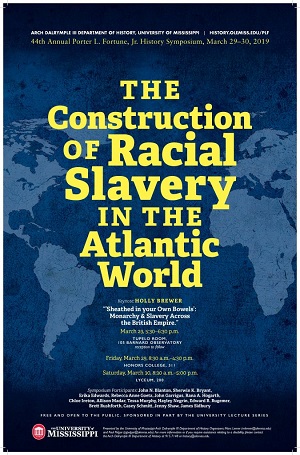
2019: The Construction of Racial Slavery in the Atlantic World
Valuing Early Modern Slavery: Settlement, Servitude, and the Development of Race Governance
Document Type
Event
Location
Honors College 311
Start Date
29-3-2019 10:45 AM
End Date
29-3-2019 11:30 AM
Description
“Labor, mineral wealth, exports and other forms of capital all predominate as measures of slavery’s value and societal impact. These metrics along with the plantation complex and the grotesque scale of racial slavery it etched have obscured our efforts to apprehend the manifold uses and values embedded within Euro-colonialism peculiar brand of racial slavery. Scarcely recalled is slavery’s foundational value as a juridical instrument of conquest and colonial rule. This essay explores slavery’s complex applications, the webs of governance it constituted, and the Euro-colonial territorial claims made possible through its mailability. It recalls the early entanglements of slavery, race, and economy in Spain’s north Andean colonial theatre, where slaveholding proved to be prohibitively expensive for many and yet indispensable to Early modern modes of self-making, social stratification, territorial claims and settlement. The seeing of the Pacific in 1513 and the invasion of its adjacent Americas set a powerful stage for 1619 Virginia and the emergence of race governance throughout the hemisphere.”
Relational Format
Conference Proceeding
Recommended Citation
Bryant, Sherwin K., "Valuing Early Modern Slavery: Settlement, Servitude, and the Development of Race Governance" (2019). Porter L. Fortune, Jr. Symposium. 10.
https://egrove.olemiss.edu/plf/2019/schedule/10
Valuing Early Modern Slavery: Settlement, Servitude, and the Development of Race Governance
Honors College 311
“Labor, mineral wealth, exports and other forms of capital all predominate as measures of slavery’s value and societal impact. These metrics along with the plantation complex and the grotesque scale of racial slavery it etched have obscured our efforts to apprehend the manifold uses and values embedded within Euro-colonialism peculiar brand of racial slavery. Scarcely recalled is slavery’s foundational value as a juridical instrument of conquest and colonial rule. This essay explores slavery’s complex applications, the webs of governance it constituted, and the Euro-colonial territorial claims made possible through its mailability. It recalls the early entanglements of slavery, race, and economy in Spain’s north Andean colonial theatre, where slaveholding proved to be prohibitively expensive for many and yet indispensable to Early modern modes of self-making, social stratification, territorial claims and settlement. The seeing of the Pacific in 1513 and the invasion of its adjacent Americas set a powerful stage for 1619 Virginia and the emergence of race governance throughout the hemisphere.”

